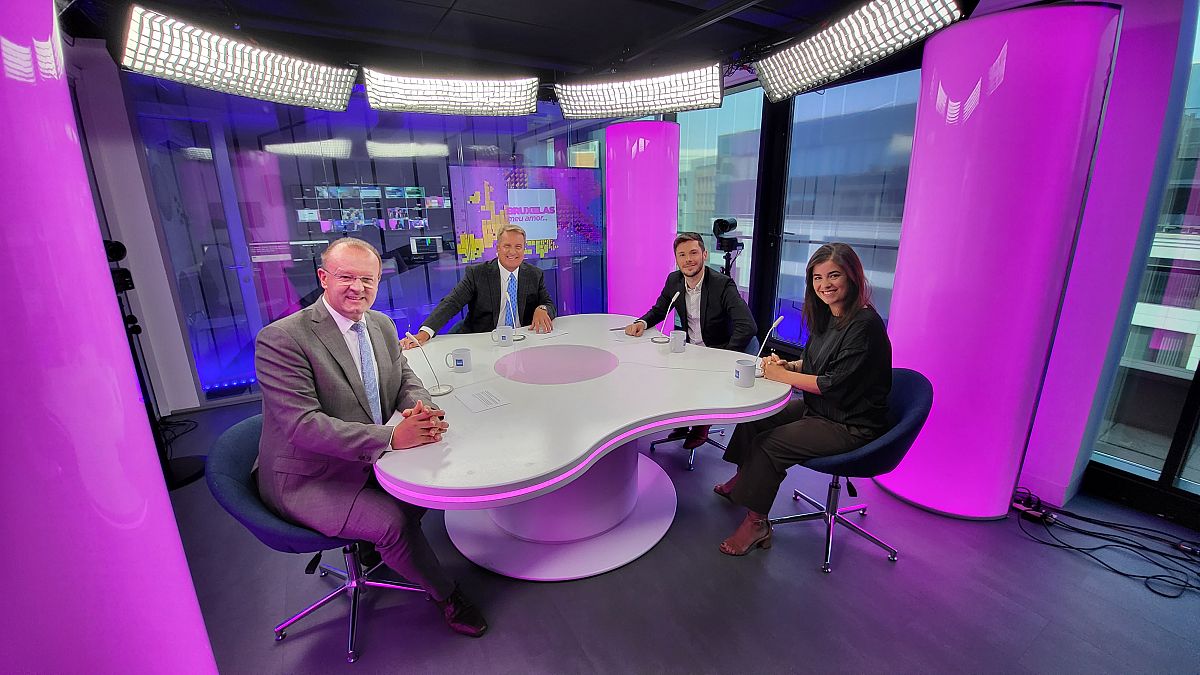Politics
Mayors London Breed and Karen Bass take different approaches to homelessness and drug use in their cities
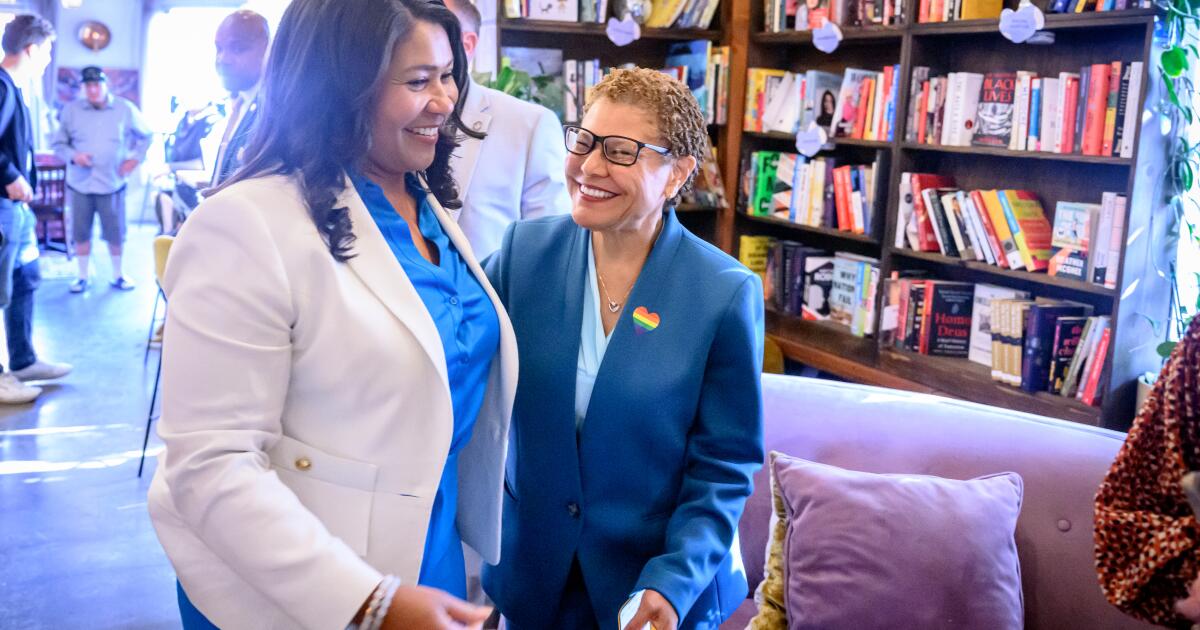
Karen Bass and London Breed each made history when they were elected, shattering glass ceilings in their respective cities as the first female mayor of Los Angeles and first Black woman to lead San Francisco.
They share many other similarities as powerful Democrats leading California’s marquee cities: a promise to reduce homelessness; plans to mitigate an opioid overdose crisis; an electorate concerned about crime.
But the ways the two mayors are attacking those urban problems reveal some surprising differences between them.
Breed, 49, has backed a tough-on-crime statewide ballot initiative that Bass, 70, does not support. The San Francisco mayor has also worked to toughen criminal penalties for fentanyl dealers and require drug screening and treatment for certain welfare recipients — issues the Los Angeles mayor has not weighed in on with financial assistance overseen by the county.
And they are split over a high-profile Supreme Court case that could make it easier for cities to clear homeless encampments: Breed has welcomed the high court’s review while Bass warned against a ruling that “could embolden those who wish to criminalize unhoused Angelenos.”
“Homelessness is the reason I ran,” Bass said during a discussion Monday at the civic engagement cafe Manny’s in San Francisco. “The main thing is getting people off the street ASAP because people are dying. But the problem in L.A. is the massive numbers.”
It was the first time the two mayors came together publicly for a one-on-one conversation. They discussed the challenges they face leading California’s most famous and influential cities.
“Homelessness is the reason I ran,” Los Angeles Mayor Karen Bass said.
(Josh Edelson / For The Times)
About 46,000 people are homeless in Los Angeles, where the population is about 3.8 million. An estimated 8,323 people are homeless in San Francisco, a city of about 808,000.
Breed said the problem in San Francisco is “a little bit different.”
Though the city has increased shelter capacity and helped 15,000 people exit homelessness, Breed said, the city faces a conundrum: The number of people who refuse housing or shelter is growing.
“The biggest problem is fentanyl, is drugs,” she said. “That has been the biggest challenge we’ve had to get people off the streets.”
Political differences in L.A. and S.F.
Breed and Bass are at different points in their mayorships, which may explain some of their divergence on policy. After six years leading San Francisco, Breed is up for reelection this year in a tough race against four serious challengers.
In contrast, Bass, who referred to herself as a “rookie” Monday, is still in a honeymoon phase after winning the election in November 2022.
“There seems to be this kind of doomy narrative in San Francisco that I don’t feel is quite as front of mind for Angelenos,” said Jason Ward, an economist at Rand Corp. in Santa Monica.
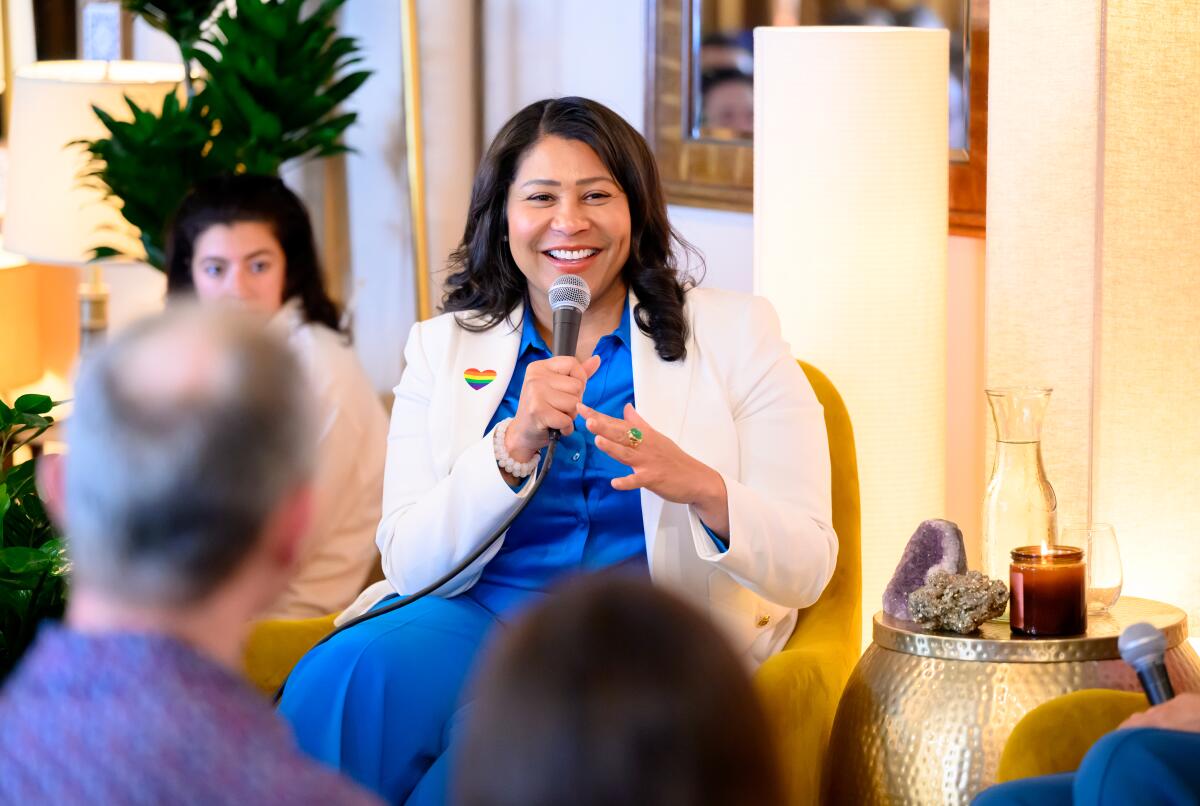
Mayor London Breed has supported some tough-on-crime strategies to address street homelessness and open-air drug use in San Francisco.
(Josh Edelson / For The Times)
As Breed’s political challenges have mounted in the last two years, she has turned to tough-on-crime strategies to crack down on street homelessness, open-air drug use and other public safety issues she once described in a speech as the “bull— that destroyed our city.”
Bass has sought a compassionate approach to homelessness without losing the support of the business community, a strategy that’s drawn praise and criticism. She has not given an endorsement in the heated L.A. district attorney race, which pits a so-called law and order candidate against the progressive incumbent.
In some instances, the two politicians are bringing the same blueprint to solving their cities’ problems.
Breed declared a state of emergency in December 2021 for the drug-infested Tenderloin district, with Bass following suit a year later with her own emergency declaration on homelessness. Both efforts aimed to make it easier to get people off the streets and increase access to resources.
Both mayors have rejected calls to roll back funding for police, even adding money for law enforcement in their city budgets, despite objections from some left-leaning voters. And they’ve each focused much of the last year on addressing homelessness via temporary shelter beds, while also putting money toward addiction and mental health services.
But it’s their policy differences that illustrate the varied ways civic leaders are trying to solve some of California’s thorniest problems.
“This is the nice thing about more and more women getting into elected life,” said Elizabeth Ashford, a Democratic strategist and board member of California Women Lead, an organization that works to elect more women. “People are going to have to rise and fall based on their own merits as leaders.”
As Black women, both mayors said their identities shape their experiences as politicians.
Bass said L.A.’s Black population is “quite small” at about 8%, and because of that she believes people misjudge her.
“I don’t mind being underestimated,” she said. “They won’t see it coming!”

San Francisco Mayor London Breed and Los Angeles Mayor Karen Bass discuss their cities’ challenges at Manny’s cafe in San Francisco.
(Josh Edelson / For The Times)
Breed echoed those same hurdles leading San Francisco, where the Black population is less than 5%.
“I’ve had to have some really hard conversations with a lot of very privileged people in this city who feel comfortable talking to me as if I’m beneath them,” Breed said.
“As African American women leading major cities, it’s different. Everybody wants the mayor to do a good job, but sometimes the challenges we face are different.”
Different approaches to fighting crime
Breed earlier this year endorsed a GOP-backed measure proposed for the November ballot that aims to roll back part of Proposition 47, a 2014 voter-approved initiative that reduced certain theft and drug felonies to misdemeanors. The measure would increase penalties for fentanyl dealers and organized retail theft rings, and provide mandatory treatment for drug users.
Bass said she doesn’t support efforts to repeal Proposition 47.
She said in a statement to The Times that the law “has its strengths and weaknesses and it should be evaluated in the same way that the impacts of any policy should be examined,” though her office didn’t make clear how she thinks the policy should be analyzed.
The mayors’ approaches “couldn’t be more different,” said Anne Irwin, director of Smart Justice California, a group that advocates for progressive changes to the criminal justice system.
Bass has “taken the lessons from the tough-on-crime era and accepted the hard truth that it didn’t work,” Irwin said. Breed, she said, has reverted to a “familiar political rhetoric” that appeases voters in the short term but fails public safety in the long haul.
“That’s why I call it an easy, expedient response,” Irwin said. “But that’s not leadership.”
While Irwin acknowledged that many San Franciscans want to see a tougher approach on public safety issues, she attributed waning voter support for Breed to what she described as an inconsistent and chaotic approach to solving those problems.
“San Franciscans are watching Mayor Breed over these past several years lurch from one approach to another based on the loudest headlines that week,” Irwin said.
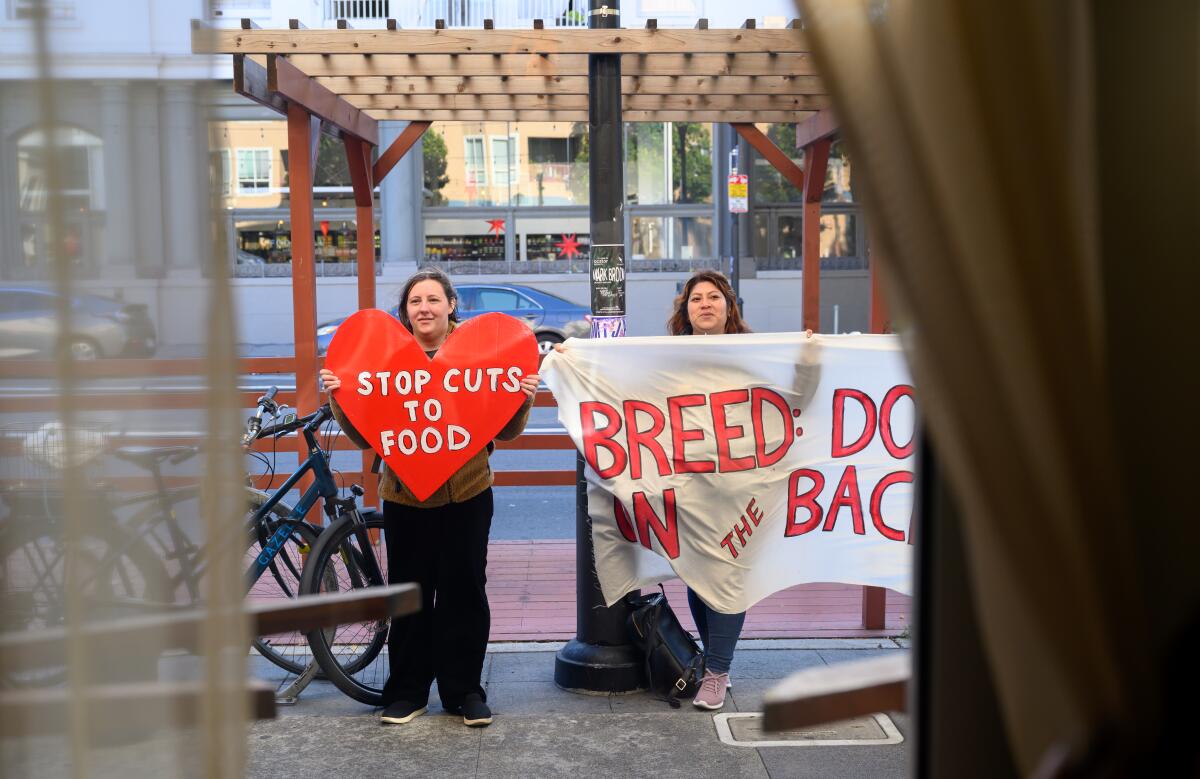
People outside the event protest budget cuts Mayor London Breed has proposed in San Francisco, including funds for child-care programs and food banks.
(Josh Edelson / For The Times)
To Breed’s supporters, she is making tough decisions for a city she loves.
Breed grew up in the Western Addition, raised by her grandmother in a tough childhood defined by poverty, gang violence and street crime. She has shared the story of losing a sister to a drug overdose nearly 20 years ago, and her brother has served more than two decades in prison for armed robbery and other charges.
“London Breed has a ton of experience being exposed to that kind of a life, and I would think that she has reacted in the way she should for the safety of her citizens,” said former Mayor Willie Brown, who made history himself as the first Black mayor of San Francisco and, before that, as speaker of the state Assembly. “And that’s what would be expected of a mayor.”
Bass has spent much of her time in office so far as she promised on the campaign trail — almost exclusively focused on homelessness. Under Bass’ Inside Safe program, which places homeless people in hotels, motels and other forms of shelter, 2,720 people have been moved from street encampments, according to officials.
She also issued an order that has dramatically sped up the city’s approval of residential projects deemed 100% affordable. In April, she said that more than 16,000 affordable housing units had entered the city’s pipeline.
Bass was raised in the Venice-Fairfax area of Los Angeles, and was volunteering for Sen. Robert Kennedy’s presidential campaign by age 14.
She founded Community Coalition, a nonprofit focused on tackling the structural racism that led to neglect in South L.A. A former emergency room physician assistant, she served more than a decade in Congress before being elected mayor.
She has sought to walk a fine line between helping people get into shelters and housing and responding to complaints from businesses and neighbors about tents and drug use.
She has mostly stayed out of the debate over a policy that gives council members the option to bar homeless encampments within 500 feet of schools and parks. The law is attacked by the most left-leaning members of the City Council, who decry it as a waste of police resources.
Bass, in interviews, has suggested that the law simply shuffles homeless encampments around, but said she won’t seek to repeal it.
The way the two mayors are responding reflects the frustrations in their respective cities, said Sam Tsemberis, chief executive of the Pathways Housing First Institute in Santa Monica.
“It comes down to personal attitudes and values,” Tsemberis said. “And also for the politicians, what will play well in terms of the likelihood of their reelection.”

Politics
Trump impersonates Elon Musk talking about rockets: ‘I’m doing a new stainless steel hub’
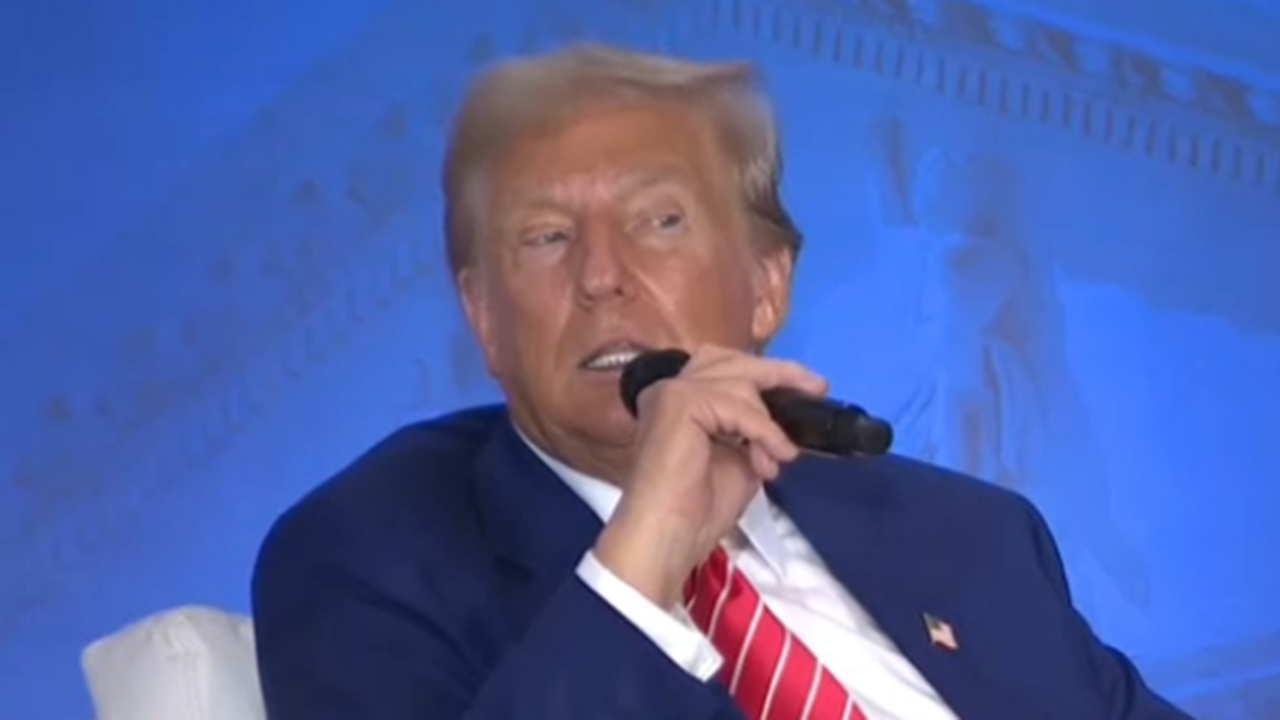
Former President Trump offered his impersonation of SpaceX and Tesla CEO Elon Musk at an event in Washington, D.C., this week, drawing laughter from a crowd as he pretended to be talking about the development of rockets.
Trump told an audience at the annual Moms for Liberty conference Thursday that Musk gave him a “tremendous endorsement” and described him as a “very different kind of a guy as he thinks [when] he talks.”
“With Elon, it’s like, ‘well, you know, I’m doing a new stainless steel hub that can get us around the engines much quicker,’” Trump said. “’Because there’s a problem with the type of engine going into space nowadays.’”
“’But in the end I think we can have a good hookup because of the new foils that are coming up,’” Trump joked.
TRUMP-MUSK INTERVIEW: 5 BIGGEST TAKEAWAYS FROM THE 2024 PRESIDENTIAL ELECTION TO THE US BORDER CRISIS
Former President Trump gives his impersonation of SpaceX and Tesla CEO Elon Musk.
“And I’m hearing everything that’s going through his mind. But he is like, he’s a super genius guy,” Trump added.
ELON MUSK CALLS OUT HARRIS FOR OLD POST SAYING ILLEGAL IMMIGRANTS ARE NOT CRIMINALS

Elon Musk, co-founder of Tesla and SpaceX and owner of X Holdings Corp., speaks at the Milken Institute’s Global Conference at the Beverly Hilton Hotel in May in Beverly Hills, California. Musk and Trump recently participated in an interview on X. (Apu Gomes/Getty Images)
The former president recently did a lengthy interview in mid-August with Musk on X and said Thursday that “I think we are going to do another one too.”
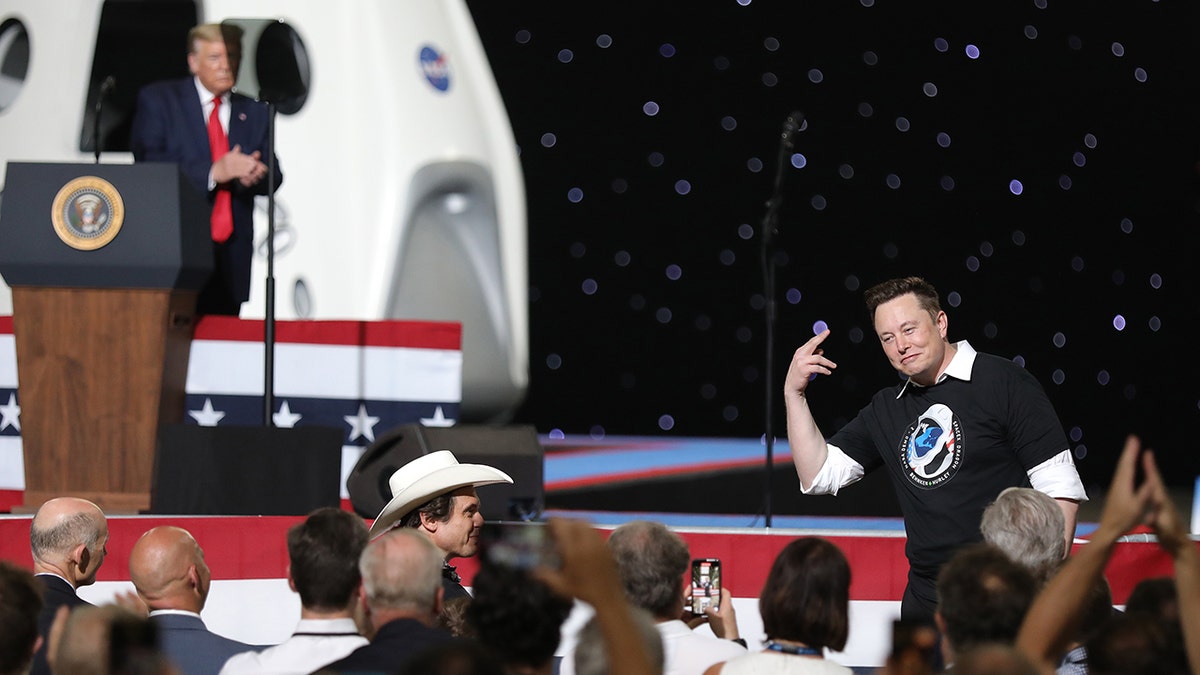
President Trump acknowledges Spacex founder Elon Musk after the successful launch of the SpaceX Falcon 9 rocket at the Kennedy Space Center on May 30, 2020 in Cape Canaveral, Florida. (Joe Raedle/Getty Images)
“I’m a huge fan of his electric car, I think it’s incredible, his car,” Trump also said. “I think of he does and I’m a big fan of electric, but they don’t go far and they are expensive.”
Politics
California is racing to combat deepfakes ahead of the election

Days after Vice President Kamala Harris launched her presidential bid, a video — created with the help of artificial intelligence — went viral.
“I … am your Democrat candidate for president because Joe Biden finally exposed his senility at the debate,” a voice that sounded like Harris’ said in the fake audio track used to alter one of her campaign ads. “I was selected because I am the ultimate diversity hire.”
Billionaire Elon Musk — who has endorsed Harris’ Republican opponent, former President Trump— shared the video on X, then clarified two days later that it was actually meant as a parody. His initial tweet had 136 million views. The follow-up calling the video a parody garnered 26 million views.
To Democrats, including California Gov. Gavin Newsom, the incident was no laughing matter, fueling calls for more regulation to combat AI-generated videos with political messages and a fresh debate over the appropriate role for government in trying to contain emerging technology.
On Friday, California lawmakers gave final approval to a bill that would prohibit the distribution of deceptive campaign ads or “election communication” within 120 days of an election. Assembly Bill 2839 targets manipulated content that would harm a candidate’s reputation or electoral prospects along with confidence in an election’s outcome. It’s meant to address videos like the one Musk shared of Harris, though it includes an exception for parody and satire.
“We’re looking at California entering its first-ever election during which disinformation that’s powered by generative AI is going to pollute our information ecosystems like never before and millions of voters are not going to know what images, audio or video they can trust,” said Assemblymember Gail Pellerin (D-Santa Cruz). “So we have to do something.”
Newsom has signaled he will sign the bill, which would take effect immediately, in time for the November election.
The legislation updates a California law that bars people from distributing deceptive audio or visual media that intends to harm a candidate’s reputation or deceive a voter within 60 days of an election. State lawmakers say the law needs to be strengthened during an election cycle in which people are already flooding social media with digitally altered videos and photos known as deepfakes.
The use of deepfakes to spread misinformation has concerned lawmakers and regulators during previous election cycles. These fears increased after the release of new AI-powered tools, such as chatbots that can rapidly generate images and videos. From fake robocalls to bogus celebrity endorsement of candidates, AI-generated content is testing tech platforms and lawmakers.
Under AB 2839, a candidate, election committee or elections official could seek a court order to get deepfakes pulled down. They could also sue the person who distributed or republished the deceptive material for damages.
The legislation also applies to deceptive media posted 60 days after the election, including content that falsely portrays a voting machine, ballot, voting site or other election-related property in a way that is likely to undermine the confidence in the outcome of elections.
It doesn’t apply to satire or parody that’s labeled as such, or to broadcast stations if they inform viewers that what is depicted doesn’t accurately represent a speech or event.
Tech industry groups oppose AB 2839, along with other bills that target online platforms for not properly moderating deceptive election content or labeling AI-generated content.
“It will result in the chilling and blocking of constitutionally protected free speech,” said Carl Szabo, vice president and general counsel for NetChoice. The group’s members include Google, X and Snap as well as Facebook’s parent company, Meta, and other tech giants.
Online platforms have their own rules about manipulated media and political ads, but their policies can differ.
Unlike Meta and X, TikTok doesn’t allow political ads and says it may remove even labeled AI-generated content if it depicts a public figure such as a celebrity “when used for political or commercial endorsements.” Truth Social, a platform created by Trump, doesn’t address manipulated media in its rules about what’s not allowed on its platform.
Federal and state regulators are already cracking down on AI-generated content.
The Federal Communications Commission in May proposed a $6-million fine against Steve Kramer, a Democratic political consultant behind a robocall that used AI to impersonate President Biden’s voice. The fake call discouraged participation in New Hampshire’s Democratic presidential primary in January. Kramer, who told NBC News he planned the call to bring attention to the dangers of AI in politics, also faces criminal charges of felony voter suppression and misdemeanor impersonation of a candidate.
Szabo said current laws are enough to address concerns about election deepfakes. NetChoice has sued various states to stop some laws aimed at protecting children on social media, alleging they violate free speech protections under the 1st Amendment.
“Just creating a new law doesn’t do anything to stop the bad behavior, you actually need to enforce laws,” Szabo said.
More than two dozen states, including Washington, Arizona and Oregon, have enacted, passed or are working on legislation to regulate deepfakes, according to the consumer advocacy nonprofit Public Citizen.
In 2019, California instituted a law aimed at combating manipulated media after a video that made it appear as if House Speaker Nancy Pelosi was drunk went viral on social media. Enforcing that law has been a challenge.
“We did have to water it down,” said Assemblymember Marc Berman (D-Menlo Park), who authored the bill. “It attracted a lot of attention to the potential risks of this technology, but I was worried that it really, at the end of the day, didn’t do a lot.”
Rather than take legal action, said Danielle Citron, a professor at the University of Virginia School of Law, political candidates might choose to debunk a deepfake or even ignore it to limit its spread. By the time they could go through the court system, the content might already have gone viral.
“These laws are important because of the message they send. They teach us something,” she said, adding that they inform people who share deepfakes that there are costs.
This year, lawmakers worked with the California Initiative for Technology and Democracy, a project of the nonprofit California Common Cause, on several bills to address political deepfakes.
Some target online platforms that have been shielded under federal law from being held liable for content posted by users.
Berman introduced a bill that requires an online platform with at least 1 million California users to remove or label certain deceptive election-related content within 120 days of an election. The platforms would have to take action no later than 72 hours after a user reports the post. Under AB 2655, which passed the Legislature Wednesday, the platforms would also need procedures for identifying, removing and labeling fake content. It also doesn’t apply to parody or satire or news outlets that meet certain requirements.
Another bill, co-authored by Assemblymember Buffy Wicks (D-Oakland), requires online platforms to label AI-generated content. While NetChoice and TechNet, another industry group, oppose the bill, ChatGPT maker OpenAI is supporting AB 3211, Reuters reported.
The two bills, though, wouldn’t take effect until after the election, underscoring the challenges with passing new laws as technology advances rapidly.
“Part of my hope with introducing the bill is the attention that it creates, and hopefully the pressure that it puts on the social media platforms to behave right now,” Berman said.
Politics
'For election purposes': Critics balk at Harris' claim she will 'enforce our laws' at southern border
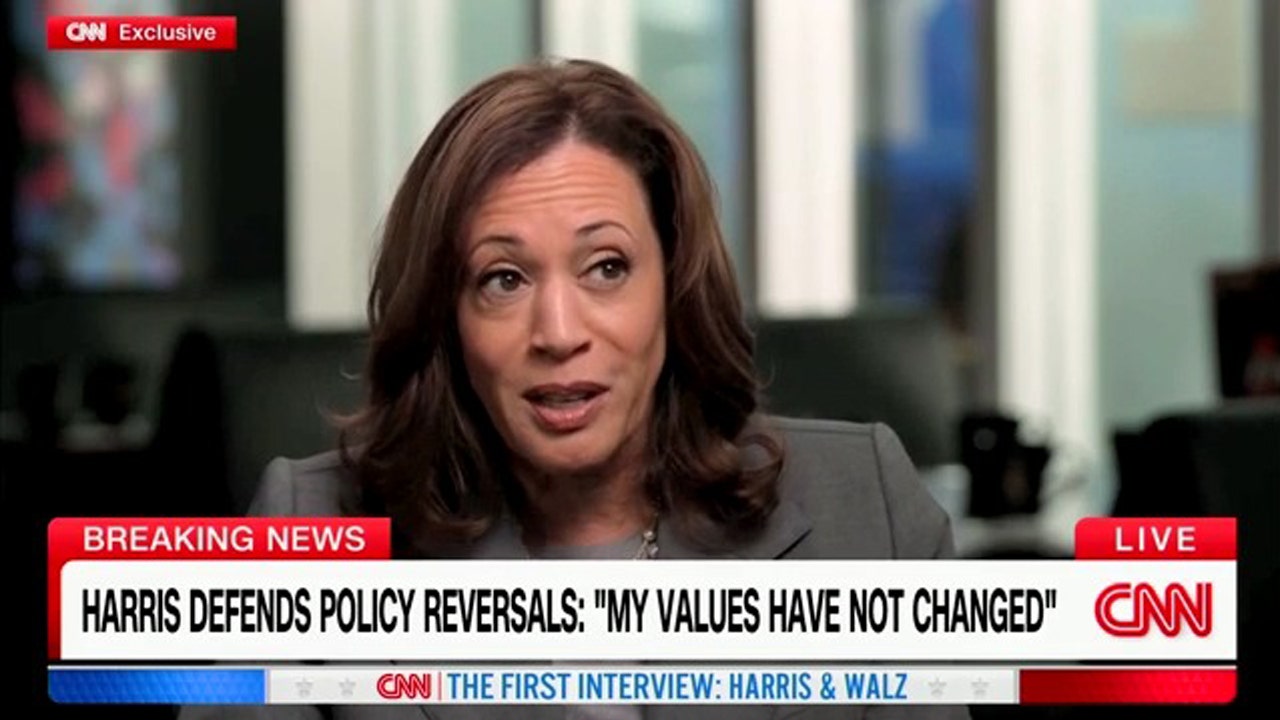
Vice President Kamala Harris made a 180-degree turn on her opinion about prosecuting illegal border crossings during her long-awaited first interview since becoming the Democratic Party’s official nominee for president.
CNN anchor Dana Bash questioned Harris Thursday about whether she still believed illegal border crossings should be prosecuted, something Harris indicated she was against while running her 2019 campaign to become president.
“I believe there should be consequence,” Harris told Bash. “We have laws that have to be followed and enforced that address and deal with people who cross our border illegally. … And let’s be clear, in this race, I’m the only person who has prosecuted transnational criminal organizations who traffic in guns, drugs and human beings. I’m the only person in this race who actually served a border state as attorney general to enforce our laws. And I would enforce our laws as president going forward.”
TOP 5 MOMENTS FROM KAMALA HARRIS’ FIRST INTERVIEW AS DEM NOMINEE: ‘I WILL NOT BAN FRACKING’
Unaccompanied minors walk toward U.S. Border Patrol vehicles after crossing over from Mexico May 9, 2023, in El Paso, Texas. (John Moore/Getty Images)
Harris’ comments Thursday contrasted with what she has said and done in the past regarding illegal immigration, particularly when it comes to illegal border crossings.
Besides indicating during a nationally televised debate that she would not pursue people who have crossed the border illegally for prosecution, she told the San Francisco Chronicle in 2015 that “an undocumented immigrant is not a criminal.” She also posted the claim on social media. And in a riff with the late Arizona GOP Sen. John McCain’s daughter, Meghan, during a 2019 episode of “The View,” Harris reiterated her stance.
“I would not make it a crime punishable by jail,” she said. “It should be a civil enforcement issue but not a criminal enforcement issue.”
As a U.S. senator, Harris sought to strip funding from Immigration and Customs Enforcement (ICE). And as California’s attorney general, she instructed local law enforcement not to adhere to ICE detainers when they request that someone who has committed a crime and crossed the border illegally be held until they can be taken into custody to initiate deportation procedures.
Harris has also compared ICE to the Ku Klux Klan.
KAMALA HARRIS OFFERS VAGUE ‘DAY 1’ OVAL OFFICE PLAN IN CNN INTERVIEW: ‘A NUMBER OF THINGS’
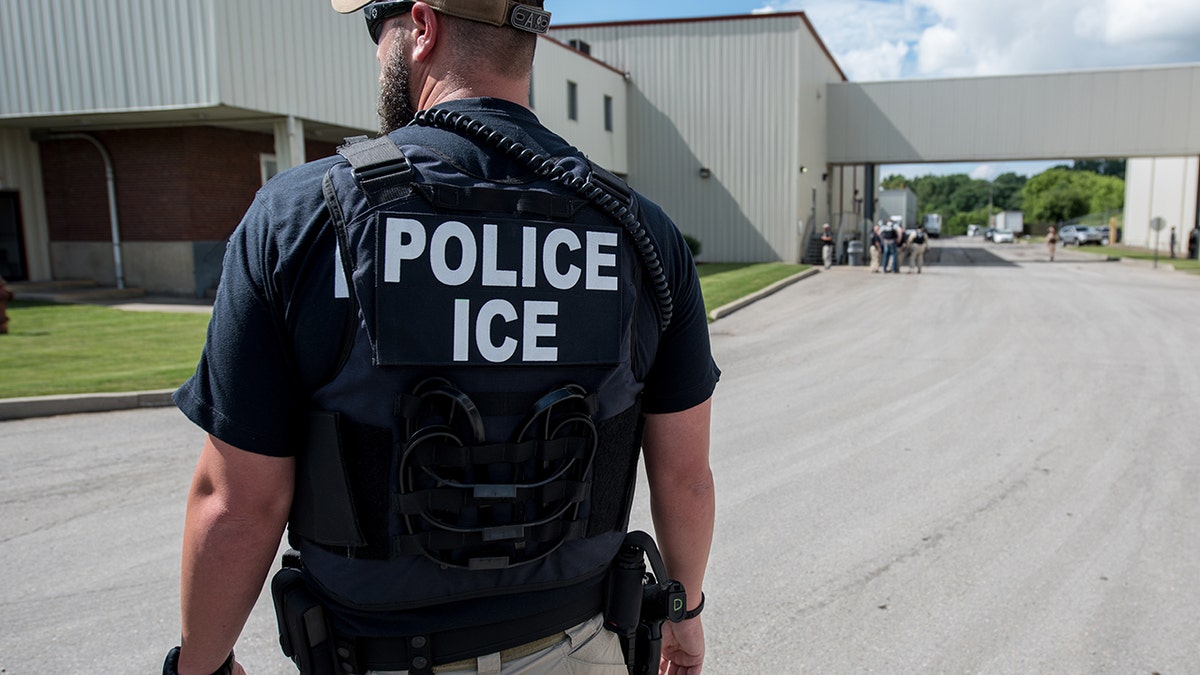
Fox News Digital spoke to critics who called Harris’ comments “insincere” and “for election purposes” only. (Smith Collection/Gado/Getty Images)
Fox News Digital spoke to two conservative immigration law experts who called her comments “insincere” and “for election purposes” only.
“If someone cares about enforcing our laws as they pertain to the border, you would think that they would be a part of and lead an administration that prosecutes sufficient offenses related to crossing the border unlawfully,” said Gene Hamilton, the director of America First Legal, a right-wing legal group founded by former Trump adviser Stephen Miller.
“The Department of Justice’s prosecution for border-related offenses are at rock bottom. They are lower than even the Obama years, and that’s saying something.”
Hamilton, who served as counselor to the attorney general at the Department of Justice under former President Trump, argued a key metric in determining how seriously an administration is taking border security is the number of illegal border crossings compared to the number of individuals deported.
Last year, there were 2.4 million illegal border crossings, according to Department of Justice data, Hamilton said.
Meanwhile, the Justice Department prosecuted around 20,000 of those violations.
“You know, the numbers — the numbers speak for themselves,” Hamilton argued. He also pointed out that in 2019, under Trump, there were fewer illegal border crossings than the country faced in 2023, but the Trump administration still prosecuted more than five times the number of illegal border crossers than the Biden-Harris administration in 2023.
“As she said last night in her interview, her values have not changed. She said that over and over again,” said Lora Ries, the director of the Heritage Foundation’s Border Security and Immigration Center. “She is telling her base, ‘Look, don’t worry about what the campaign is saying right now. We just have to say that to try and get elected. But my values have not changed.’”
NBC REPORTER CALLS OUT KAMALA HARRIS FOR SAYING HER ‘VALUES HAVEN’T CHANGED’: ‘HER POSITIONS HAVE CHANGED’
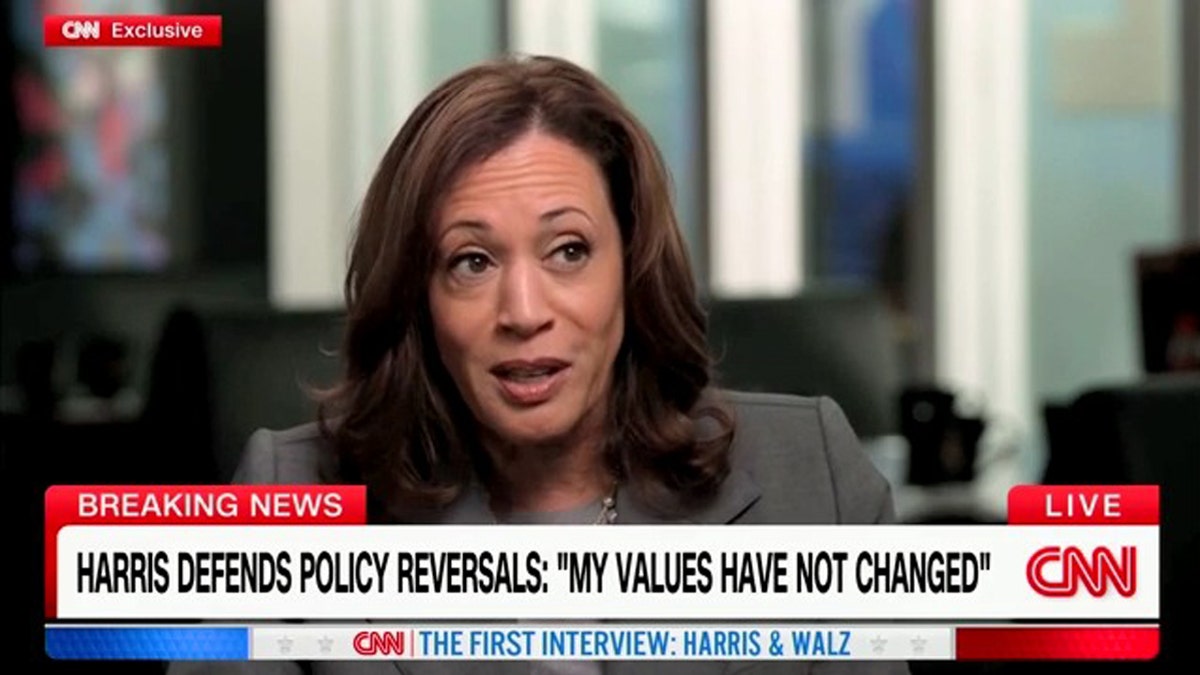
Vice President Kamala Harris raised eyebrows when telling CNN’s Dana Bash that her “values haven’t changed” after making complete reversals on far-left positions she held in 2019. (Screenshot/CNN)
CNN’S KAMALA HARRIS, TIM WALZ INTERVIEW CAN BE SUMMED UP IN JUST TWO WORDS
Ries slammed the Biden-Harris administration for “gaslighting” the American public but argued the Harris campaign “is taking it to another level” by denying Harris was tapped to be the border czar and pretending as if she is not in power and able to enact tougher measures at the border.
“She’s in power right now. If she truly meant it, she would do it now, and she’s not. But to pretend like you’re not in power and not in office right now is a higher level of gaslighting,” said Ries. “I think this is just, you know, for election purposes.”
Hamilton echoed that statement, calling Harris’ comments Thursday “insincere.”
Fox News Digital reached out to the Harris campaign repeatedly for comment but did not receive a response.
-

 Connecticut1 week ago
Connecticut1 week agoOxford church provides sanctuary during Sunday's damaging storm
-

 Technology1 week ago
Technology1 week agoBreakthrough robo-glove gives you superhuman grip
-
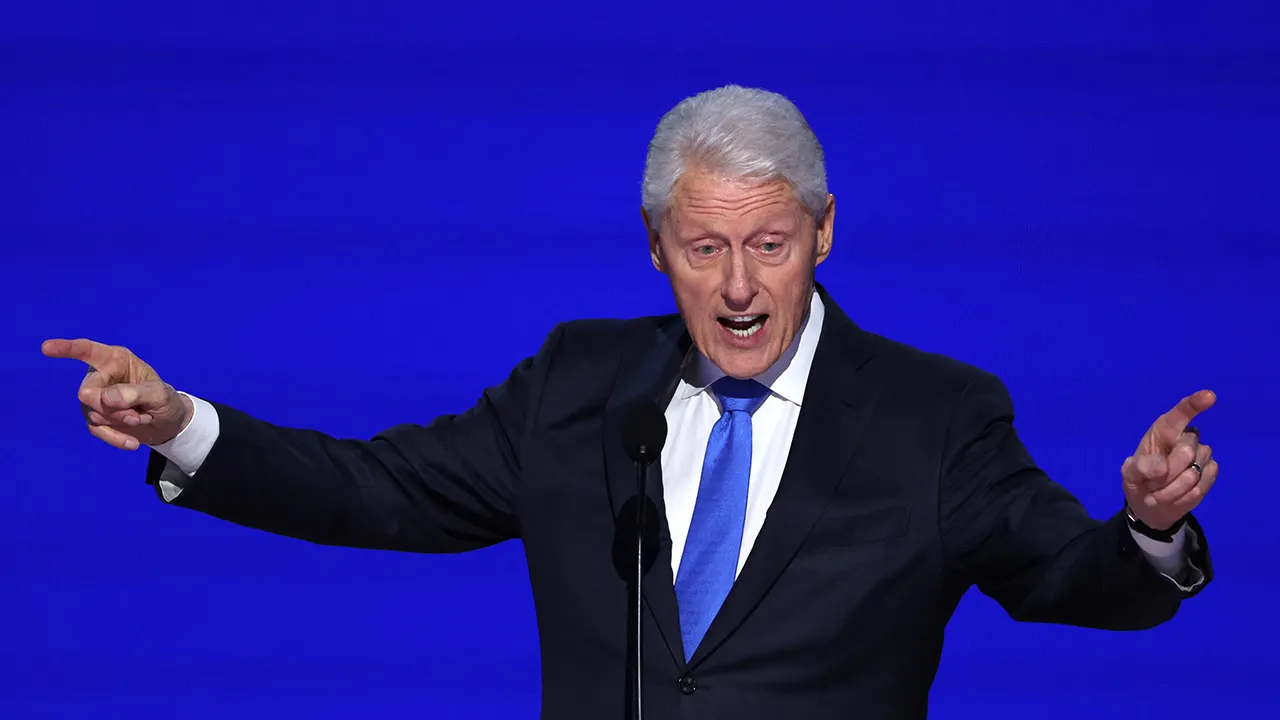
 Politics1 week ago
Politics1 week agoClinton lauds Biden as modern-day George Washington and president who 'healed our sick' in DNC speech
-

 Politics1 week ago
Politics1 week ago2024 showdown: What happens next in the Kamala Harris-Donald Trump face-off
-

 News1 week ago
News1 week agoWho Are Kamala Harris’s 1.5 Million New Donors?
-
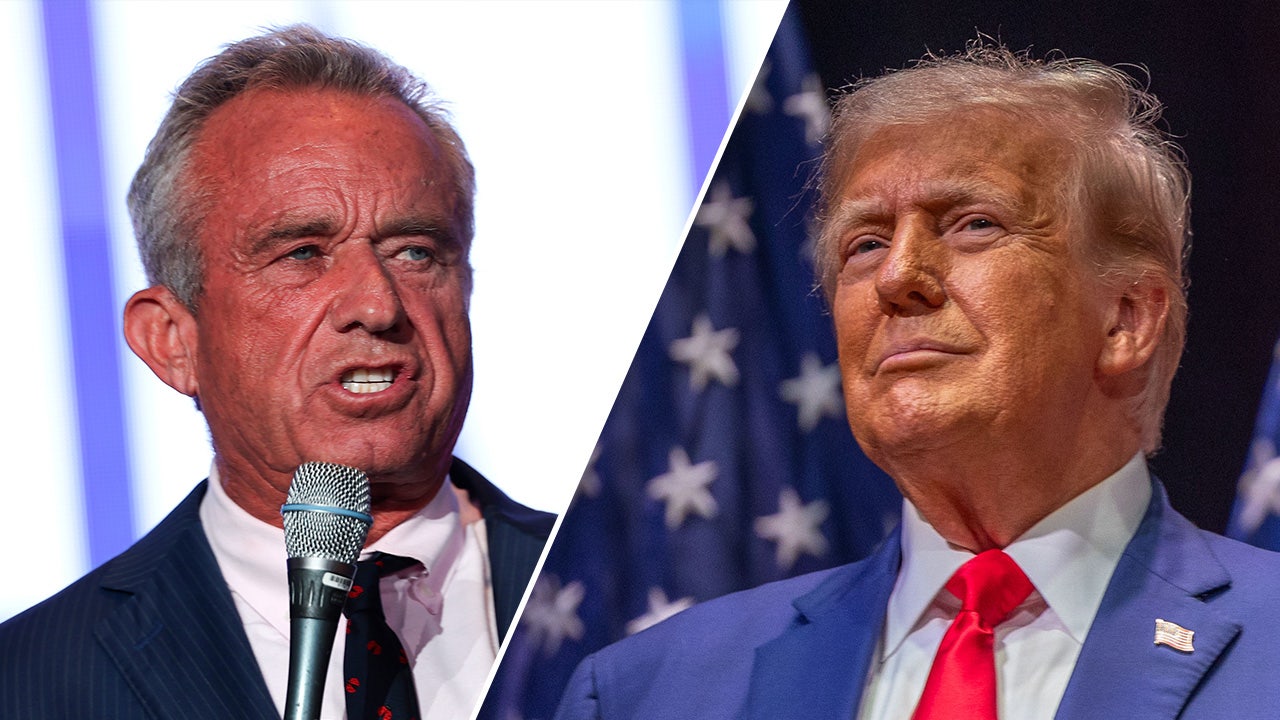
 Politics1 week ago
Politics1 week agoTrump taunted over speculated RFK Jr endorsement: 'Weird as hell'
-
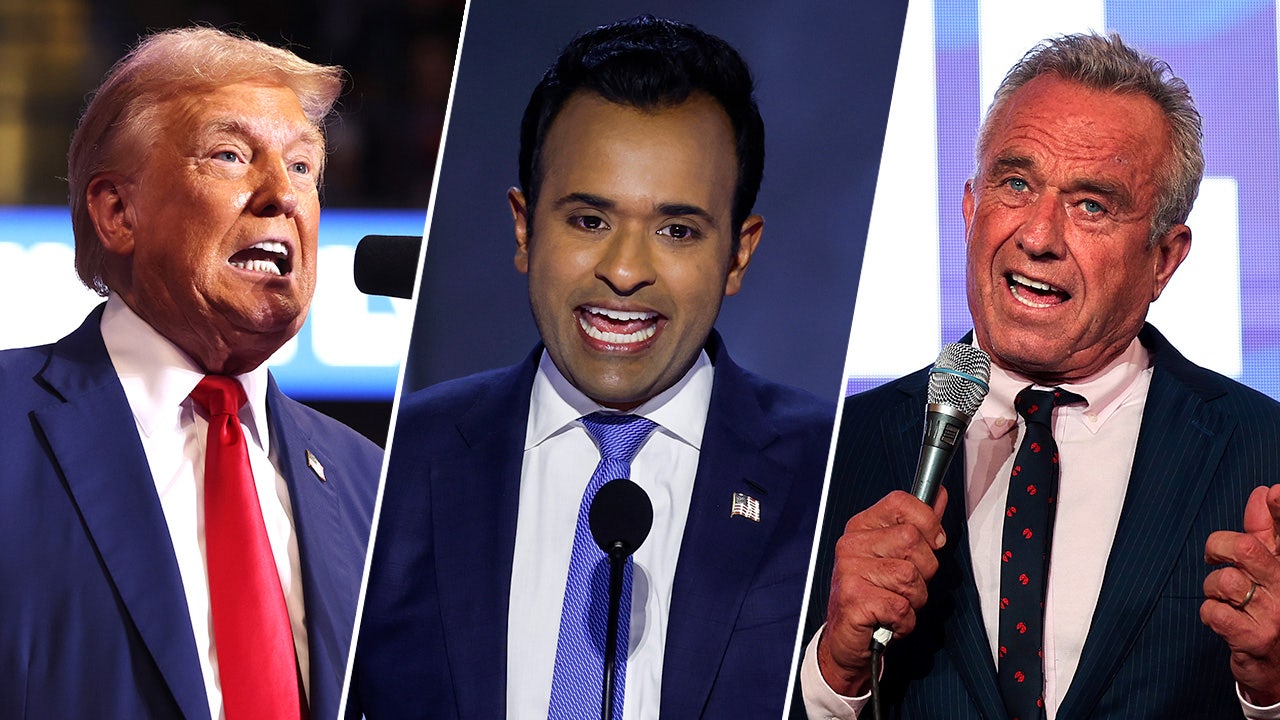
 Politics1 week ago
Politics1 week agoVivek Ramaswamy sounds off on potential RFK Jr. role in a Trump administration
-

 World6 days ago
World6 days agoPortugal coast hit by 5.3 magnitude earthquake












